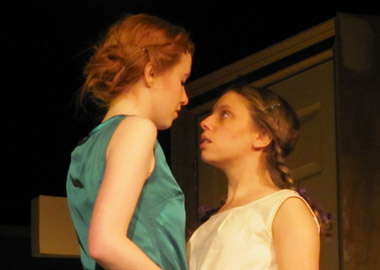There’s a seminar this Sunday at the Yiddish Book Center titled “Is Got fun Nekome (God of Vengeance) a Queer Play?” It’s part of the free one-day Queer Jews and Allies Conference on the Hampshire College campus, and coincides with a student production of the play.
Whether or not God of Vengeance fulfills the definition of “queer,” it’s a piece that has tested the definitions of obscenity, blasphemy and Jewish identity. It was written in 1906 by Polish-born Sholem Asch for the Yiddish theater that flourished on New York’s Lower East Side. In 1923 an English version became the first play from the Yiddish theater to be performed on Broadway—where it was promptly closed down by the censorship board and the entire cast jailed on obscenity charges.
The conventional image of New York’s Yiddish theater is one of broad ethnic comedy and sentimental old-country melodrama. Got fun Nekome was different. Its unorthodox (in both senses) plot concerns a man, Yankel, who runs a brothel in the basement of his house. Wishing to be respected in his community and make a respectable marriage for his teenage daughter, Rivka (called Rivkele), he arranges with the pliable village rabbi to buy a Torah scroll for her dowry and arranges a wedding with a pious local youth. Rivka, however, has fallen in love with someone else: Manke, one of her father’s “girls.”
Over the years, as society’s scruples have shifted, so have the play’s flashpoints of controversy. The original version’s primary target was hypocrisy in organized Judaism, explains this production’s dramaturg, Staci Akselrod: “How people could say one thing about how pious they were, but act in a different way.” When the play was produced on 42nd Street in the ’20s, although the stated reason for the censorship was its lesbian theme, the protest was led by Reform Jews who had moved uptown, out of the ghetto, and were incensed by the implied depiction of assimilation as pimping. In the 1999 adaptation by Donald Margulies that’s being produced here, the focus turns more strongly to the two young women in love, Rivkele the virginal daughter and Manke the harlot.
However, adds the show’s director, Rachel Friedman, “the biggest struggle for our actors has been the aggression and violence coming from the men”—both Rivkele’s father and a younger man, Shloyme, who wants to open his own bordello—”and the oppressive nature of attitudes toward the women. I’ve been very aware that in modern times, sexual violence and domestic violence is a very prominent issue.”
Perhaps ironically, in all versions of the script the family’s outrage at Rivkele’s liaison with Manke is not primarily aimed at the lesbian encounter, Akselrod says: “No one ever questions the fact that it’s two women, just that Manke is a prostitute, and that’s not the life that people have set for Rivkele.”
As if in answer, Margulies has one of the prostitutes ask, “Are we any different from the shopgirls, or the factory girls, or the secretaries? We’re all out to earn a buck. We all gotta survive.”
God of Vengeance: Dec. 1-4, 6-8, 8 p.m., Emily Dickinson Hall, Hampshire College, (413) 559-5351, theatre.hampshire.edu.
“Is Got fun Nekome a Queer Play?” Dec. 4, 5 p.m., Franklin Patterson Hall, Hampshire College. Free and open to the public.



